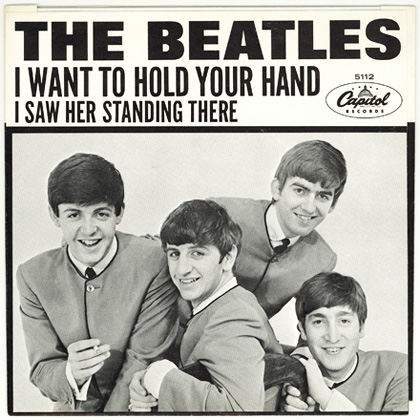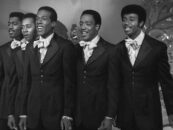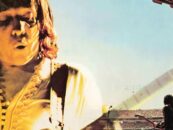 Hard to imagine – impossible really – but Capitol Records, which is essentially synonymous with the rise of The Beatles in America, had turned down their sister U.K. label Parlophone’s efforts to release the group’s singles stateside.
Hard to imagine – impossible really – but Capitol Records, which is essentially synonymous with the rise of The Beatles in America, had turned down their sister U.K. label Parlophone’s efforts to release the group’s singles stateside.
That all changed with “I Want To Hold Your Hand.” The single was released in the U.K. on November 29, 1963, though it took two weeks to hit #1 there where the group’s “She Loves You” was ensconced.
Capitol scheduled it for a mid-January 1964 release but clever U.S. radio DJs that were privy to the song’s overseas success arranged to get copies shipped to them and began playing the import early. This forced Capitol’s hand and the single’s release date was moved up to December 26 to “Capitol”-ize on the demand. (OK, we made that word up.)
“By that time,” says George Harrison, in The Beatles Anthology, “Capitol Records had been told [by Beatles manager Brian Epstein] ‘you can have them on the condition you spend $70,000 dollars advertising them,’ which sounded enormous, but they did. So that was part of the deal. They had to promote us.” With the floodgates opened, the 45 is reported to have sold 250,000 copies within days.
The Beatles’ impact in America cannot be overstated: When “I Want To Hold Your Hand”—with John Lennon and Paul McCartney both singing lead—hit #1 on February 1, 1964, it became the first of seven #1 singles they achieved in a one-year period, launching both Beatlemania and the British Invasion.
Speaking of “hand,” check out what McCartney is holding in his hand in the above picture sleeve.
Watch their performance on The Ed Sullivan Show eight days later
This is the first in a series of articles about “I Want to Hold Your Hand” and its significant impact towards the start of Beatlemania in the U.S.
The Beatles: 1964 U.S. Albums In Mono, out of print on vinyl since 1995, was released in a 2024 eight-LP boxed set, available in the U.S. here and in the U.K. here. Complete details are available here.
2025’s 12-LP and 8-CD editions of the Beatles’ Anthology Collection are available in the U.S./worldwide here, in Canada here and in the U.K. here. Anthology 4 is available as a standalone 3-LP or 2-CD set in the U.S./worldwide here, in Canada here and in the U.K. here.
Related: The Beatles’ BBC Sessions of 1963







4 Comments so far
Jump into a conversationWho holds the record( Pun intended) for the most number ones in a single year?
The Beatles, in 1964, with 6 number one singles : I Want To Hold Your Hand, She Loves You, Can’t Buy Me Love, Love Me Do, A Hard Day’s Night, I Feel Fine.
It is worth noting that in that performance on the Sullivan show, Lennon’s microphone is not nearly as loud as McCartney’s. The reason for this, according to mythology, is that the sound people for the Sullivan show believed that each group had only one lead singer. So in a song with a double lead vocal, only one singer was given a “lead” microphone.
The first time I heard this record was in Jan of ’64. A family friend’s eldest daughter bought it and her sister, my friend Cheryl, said you gotta hear this> I was 7, but was into real music. It had the same effect on me as it had on everybody else-WOW! One thing Capitol did do right was to include the single on the Meet the Beatles album! My folks got that one for me when it came out.